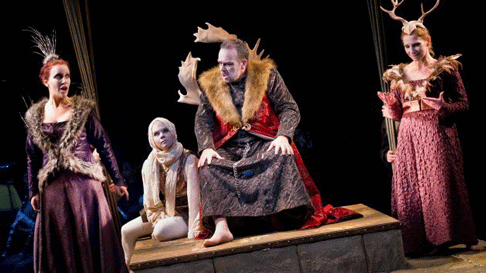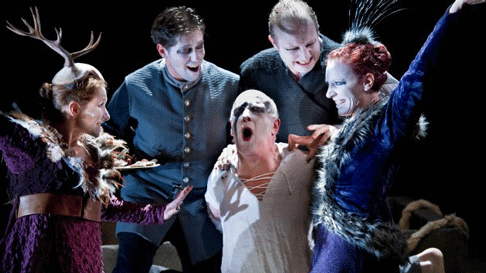His words perhaps recall the aged Lear’s earlier hope that he
might one day “Unburdened crawl towards death”. Or, as Edgar
interprets, they may evoke the more terrifying image of the Day of Judgement.
Whatever they infer, choosing Kent’s words as the title of an opera which
— its sub-plots stripped away, its minor (and some major) characters
shorn of significance — lasts less 90 minutes but which leaves the
audience longing for the eponymous conclusion, is a potentially dangerous
move.
It’s not that Alexander Goehr’s new opera has no musical or
theatrical merits. Indeed, the first act moves briskly along and, for one
unfamiliar with its poetical predecessor, raises a few interesting ideas. But,
the second act rapidly loses focus; essentially this ‘personal
take’ on Lear has little to say or reveal.
“It’s about old men who get it wrong when they have power and
influence — and then get into a mess. That’s the reason I’m
doing this opera. […] As an incipient old man myself, that’s what
interest me about the story. I mean, I can do Romeo and Juliet now
— I’m past that stage.’”
So Goehr declared in a recent interview in The Guardian, explaining
his decision to tackle one of Shakespeare’s most complex, profound and
disturbing plays, and one which defeated even Verdi and Britten, who abandoned
long-held ambitions to compose an opera based on King Lear. Now aged
78, Goehr professes that the impetus to tackle Lear came when, suffering from
depression upon retiring (reluctantly) from his Professorship at Cambridge
University, he happened to have a dream in which the play was ‘staged as
a Japanese Noh play’. The resulting opera mingles Noh stylizations with
Elizabethan conceits but the sum of the parts lacks substance and coherence.
One is reminded less of the successful cross-cultural integration of Noh
practices with the medieval Mystery Plays in Britten’s church parables
and rather more of the somewhat laboured device of the Male and Female Chorus
in The Rape of Lucretia. Conway’s production — in which
the chorus of principals stand (‡ la Brecht — another layer of
cultural reference) white-faced and stock-still, motionlessly addressing the
audience, ritually step through boxes of sand, and indulge in stylized dance
movements (for example to accompany the blinding of Gloucester) — taps
into the Noh clichÈs but offers little illumination.

Indeed, the shadow of Britten hangs over this opera in more ways than one.
The decision to use Shakespeare’s text verbatim recalls the approach of
Britten and Pears when constructing the libretto of A Midsummer
Night’s Dream. In this case, the eminent scholar, the late Frank
Kermode, fashioned a libretto which Goehr has arranged in ’24
preludes’. But, while reducing the work to a manageable length —
excising several (essential?) aspects of the drama and focusing on the central
exchange between Lear and Gloucester — this still leaves the problem of
how to find an appropriate melodic idiom for Shakespeare’s poetry.
Goehr’s rather spiritless arioso simply does not convey the rich depths
and meanings embodied in the sounds and rhythms of the spoken play. Moreover,
the composer’s re-ordering of various episodes destroys the narrative
coherence and makes it near impossible for anyone lacking knowledge of the
original play to follow the psychological development.
The singers and players of English Touring Opera do their best. Lisa
Markeby, playing both Cordelia and the Fool — a now familiar theatrical
device — is appealing, but she is not given the opportunity to develop
and express the full extent of her inner goodness. And, while the expressive
focus of the opera is supposedly the meeting of the two foolish old men, Lear
and Gloucester, now chastened and wiser as they reflect on their short-comings,
the musical fabric fails to convey their supposed transformation. Roderick
Earle bellows and blusters as an aggressive Lear, his scenes with Nigel Robson
(Gloucester) lacking genuine emotional depth and sincerity. As Edgar, Adrian
Dwyer is convincing and impressive. Goneril (Jacqueline Varsey) and Regan
(Julia Sporsen) are not musically differentiated and have little dramatic role
to play.

Ryan Wigglesworth draws clear lines and textures from his band, the Aurora
Orchestra. Goehr does create some interesting colours, not least through his
use of the chamber organ and guitar — which evoke fittingly Elizabethan
timbres — but the composite impression is one of episodic, unrelated
colourings designed to fill the gaps between scenes.
In his programme note, Goehr asks for the audience’s indulgence:
“So it remains only for me to say, that you will not be home too late and
ask that by your clapping you show some approval for what has been done
here.” This seems to me to be a patronising appeal to an audience that
may long for a less superficial musical response to a play that interrogates
essential questions of human existence.
Promised End is at the Linbury Studio at the Royal Opera House,
London on 11, 14, 16 October and then tours until 26 November. For touring
details see www.englishtouringopera.org.uk.
Claire Seymour
image=http://www.operatoday.com/Promised_End_01.gif
image_description=Photo by English Touring Opera
product=yes
product_title=Alexander Goehr: Promised End
product_by=Lear: Roderick Earle; Goneril: Jacqueline Varsey; Regan: Julia Sporsen; Cordelia: Lisa Markeby; Gloucester: Nigel Robson; Edgar: Adrian Dwyer; Edmund: Nicholas Garrett; Knight/Servant: Jeffrey Stewart; Servant/Captain: Adam Tunnicliffe. Director: James Conway. Conductor: Ryan Wigglesworth. Designer: Adam Wiltshire. Lighting: Guy Hoare. English Touring Opera. The Aurora Orchestra. Linbury Studio, Royal Opera House, Covent Garden. Saturday 9th October 2010.
product_id=All photos courtesy of English Touring Opera